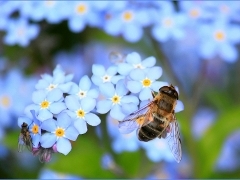Bee garden ready for World Bee Day


Bees support biodiversity and food production. However, despite their importance, pollinator populations are in decline. Habitat loss, pollution and climate change are all having an effect.
To help raise awareness of their plight, the United Nations established World Bee Day on 20 May. This year's theme "Bee inspired by nature to nourish us all" urges people and organisations to take action.
Lead Councillor for Environment and Climate Change, Cllr George Potter said:
"We're very lucky in Guildford to have such a rich pollinator population, as shown by the great work of our parks and countryside teams at Chantry Wood and Tyting Farm.
"World Bee Day highlights the vital role these small creatures have in our ecosystem and why it's so important we do what we can to help them thrive. Whether it's taking part in No Mow May or planting in your garden, small actions make a big difference."
In the past year, the Council has worked in partnership with the conservation charity Buglife to enhance 'B-Lines' throughout the borough. These are landscape corridors across England that are particularly important for bees and other pollinators.
Buglife carried out surveys to identify and map out B-Lines and works have taken place to enhance and maintain these key areas for pollinators. This includes sowing locally sourced wildflower seed and grazing sites with cattle, to create flower-rich landscapes that provide unique habitats and a vital boost for a wide range of bee species.
Cllr Potter went on to say:
"We have a strong bee population in Guildford. Surveys carried out by Buglife at Chantry Wood and our new nature reserve at Tyting Farm have identified a number of different bees including:
- Large Gorse Mining Bee
- Little Flower Bee
- Carder Bees
- Forest Cuckoo Bee
- Yellow-legged Mining Bee
- Red-tailed Bumble Bee
- Buff-tailed Bumble Bee
- Nomad Bees
"There are also some wonderful plant displays in Guildford's Castle Grounds and Stoke Park Gardens which, like our visitors, we hope bees will enjoy too!".
How you can help Guildford's bee population
Here's some top tips from the GBC parks team to help nurture the bee population in your garden, even if you have a small space or window box:
- Planting: There are a wide variety of plants that attract bees and bring pleasant colours and smells to your outdoor space. Lavender, sunflowers, catmint and echinacea (coneflower) are all good options.
- No Mow May: Taking part in No Mow May helps wildflowers and weeds to bloom. It provides valuable nectar and habitats for pollinators at this important time for their wellbeing.
- Avoid pesticides: The use of pesticides is one of the most damaging practises for bee populations. Consider using natural pest control methods and organic gardening practices.
- Build a bee hotel: Adding a bee hotel provides vital nesting spots for pollinators. You can easily make a bee hotel by using untreated wood blocks with drilled holes of different sizes, or using hollow stems from plants such as grasses and reeds. Place your hotel in a sunny location, ideally sheltered from wind and rain.
Find out more about how we're reacting to the Climate Emergency.
